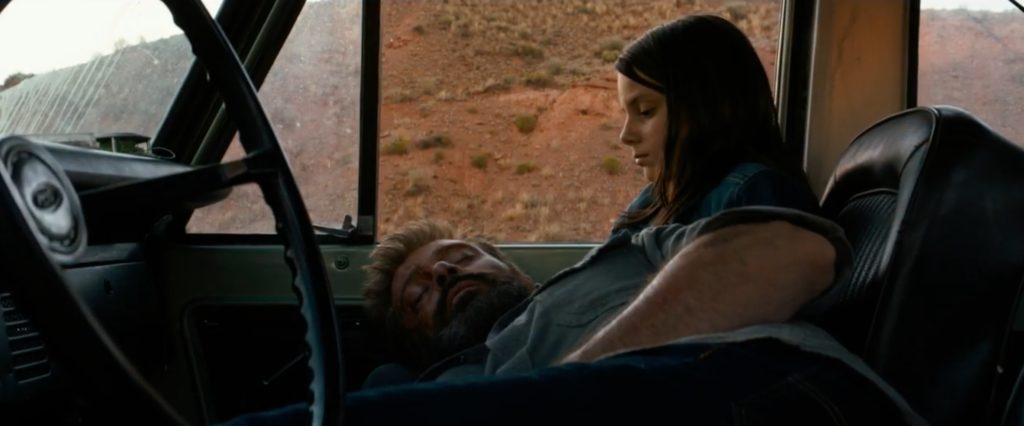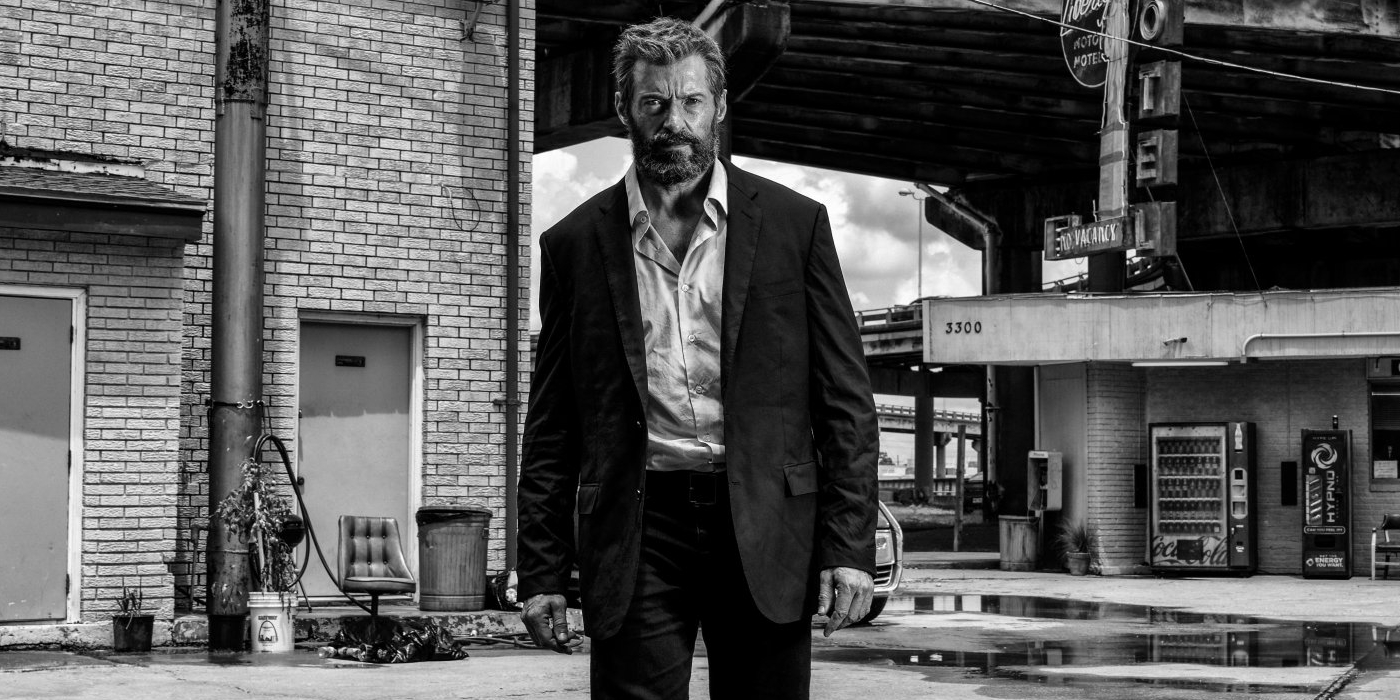WARNING: SPOILERS ABOUND.
IF YOU HAVEN’T WATCHED THE MOVIE, GO WATCH IT FIRST. DON’T SAY WE DIDN’T WARN YOU!
Haunting, aching, beautiful, the super(anti)hero film Logan lingered in my mind long after I left the cinema.
It is clear that there are multiple, deliberate references to God and Christianity. As a Christian, it’s good to know that Christianity is still alive in a supposedly post-mutant future in 2029.
Early in the film, Logan (Hugh Jackman), in a conversation with Professor Xavier (Patrick Stewart), says: “We always thought we were part of God’s plan. Turns out we were God’s mistake.”
This conversation is ambiguous. Just before this, Logan says that there are no other mutants left; they are all gone. Why? At this point we don’t know yet. But the reference to God’s plan is pretty meta. In the Marvel cinematic universe, the mutants have been treated as gods. I mean, Wolverine was practically immortal and Prof X almost omniscient. Magneto himself said so in Days of Future Past.
But in Logan, the mutants aren’t gods.
In the first scene of the film, we see a haggard Logan, now working as a limo chauffeur and sleeping in the car, woken up by a bunch of thugs trying to steal his car tyre plates. Logan gets up and fights them off, warning beforehand, “you really don’t want to do this”. As the viewer, you think, “yeah, he’s gonna own you”. But Logan doesn’t. He kills a bunch of them, but not as easily as you would have expected. And gunshots to his body actually weaken him.
Then when we first see Prof X in the film, you expect professorial gravitas, but you instead get a senile nonagenarian who’s got
Alzheimer’s or something.
So no, these are not gods. These are an endangered species; the so-called gods could not see themselves as gods.
They have to believe in something higher than themselves. Even the so-called gods themselves need a God. They certainly need purpose. When they try to escape being chased by the bad guy cyborgs, the Reavers, Xavier remarks to Logan: “Doesn’t this give you purpose?” That is telling.
Presumably, after the demise of mutant-kind, humankind transited into a post-gods reality. Where there had once been fear, the humans have since mythologised and commercialised their former gods.
Later in the film, we see X-Men comic books. This gets pretty self-referentially meta. The bad guy in the film, Donald Pierce (Boyd Holbrook, the Narcos DEA agent), remarks that he grew up reading about Wolverine and had once admired him. We soon realise that the comic books are a loose parallel to religious Scriptures, like the Bible. The stories are loosely based on “real” events in the X-Men universe but mostly fiction.
We find out that the young female charge Laura (Dafne Keen), who persistently demands that Logan brings her to “Eden”, got her idea from the comic books. The coordinates given to Logan by Laura’s previous minder Gabriella (Elizabeth Rodriguez), a kindhearted nurse in the bad guy corporation Transigen, turns out to be numbers from the comic books. When Logan finds out about this, he’s really pissed. His plans, his life – already a rather wretched one – are foiled by her supposed fantasy of Eden, which we are to assume does not exist.
Or does it?

At the pivotal point of the story arc, we find ourselves at the dinner table in a warm rural country home of a black Christian family, the Munsons. Mommy wears a large cross around her neck. The family says grace, with the mutants no less, before eating.
They have a normal family conversation. Mommy declares that “the Lord will provide”. We see a Cross in the dark behind Logan.
Why is this a pivotal point? The film deliberately slows down at this scene. Unhurried grace. The grace of having a “normal life” with a “normal family”. Despite the lurking danger, Xavier insists that they stay the night. Why? He wants Logan to experience life as it should be. A family. A home. He says to Logan, “it’s not too late”.
This is where I finally understood the motivations of Logan and Xavier. They have had their run. They are jaded. They have spilled enough blood. Their friends, their family, have all gone. There is no more meaning or purpose in life.
But Xavier did not see it that way for Logan. Remember, Logan was presumed to be immortal. Xavier wanted Logan to find meaning and purpose in being family with Laura (and perhaps hopefully the other mutant kids which Transigen had created in test tubes out of mutants’ DNA).
But something even more pivotal happens here. The bad guys come and kill the Munsons. Just before Logan comes back to the house, Xavier weeps and confesses on the bed, a Bible next to him, that he vaguely remembers what happened at Westchester – “something unspeakable”. Earlier in the movie, a radio broadcast mentioned this incident, in which many people were paralysed or and the X-Men killed.
We see a Xavier who is far from a saviour. He could not control his mind in his declining frailty and mortality. The guilt must have been lurking somewhere inside him. When he remembers, he is a man in need of absolution. He cries, “I don’t deserve any of this!” – a heart-wrenching moment. A sinner crying out for grace. He needs redemption.
In a sense, Prof X finds his redemption. It is suggested that Xavier has something to do with Laura finding her way to Logan. And because of this series of events, the young mutants survive the onsalught of the humans. This, too, is Logan’s redemption: He brings Laura to where the coordinates where Eden is supposed to be.
Here we do not find heaven, but – to our surprise – a temporary haven. A camp built by the other mutant kids who escaped Transigen, who are waiting for Laura before they can make their escape to Canada (yes, America, Canada welcomes refugees).
Logan couldn’t have been more wrong about Eden. This Eden isn’t paradise. But this Eden is all the family that Laura has. This Eden is the hope of a place of peace.
At the end, Logan finds his peace. He dies saving Laura and the other kids from the bad guys. Just before he dies, Laura cries and calls him daddy. Before this scene, Logan is about to leave the kids to run to Canada on their own, incurring Laura’s resentment. Logan said this isn’t what he signed up for. Whoever he cared for would inevitably get hurt. Laura’s sharp retort – “well then I’ll be fine” – stings.
But Logan dies redeemed. He dies as a father.
His last words are, “so this is what it feels like”. He looks satisfied, but what he means is left ambiguous. Is it fatherhood? Is it death? Is it the end of his running?
Logan dies not so much absolved for his past sins, but contrite and humbled, his heart filled with love. The outer shell of raw roughness and the impulse of pushing the people he cares about away finally gives way.

The kids bury Logan. They use branches to make a cross at his grave. Laura conducts a quasi-funeral service, having watched one on a film with Prof X in a hotel room earlier, quoting from the classic Western film Shane: “There’s no living with a killing.
There’s no going back from one. Right or wrong, it’s a brand. A brand sticks. There’s no going back. Now you run on home to your mother, and tell her everything’s alright. And there aren’t any more guns in the valley.”
It suggests that the anti-hero of Logan, like the killer cowboy in Shane, was in a sense never able to escape bloodshed. He had to do what he had to do. And he had to live with the moral ambiguity. But at least for those he left behind, “there aren’t any more guns in the valley”.
And so it goes for the kids who then made their way off to a place of peace. Though not before Laura lifts the cross and rotates it to form an ‘X’. (In the original comic Old Man Logan series, Wolverine was crucified by the Reavers on an “X”.)
But that is not the end of this. In the post-show credits, James Mangold plays us Johnny Cash’s The Man Comes Around, a song about judgment day, two verses of which goes like this:
There’s a man going around taking names
And he decides who to free and who to blame
Everybody won’t be treated all the same
There’ll be a golden ladder reaching down
When the man comes around
The hairs on your arm will stand up
At the terror in each sip and in each sup
Will you partake of that last offered cup
Or disappear into the potter’s ground
When the man comes around
There was to be no superhero resurrection for Professor X or Wolverine. But we are reminded that in the final analysis, there will be a resurrection of the dead. There will be a reckoning of all our deeds, all our sins, all our faith. The Munsons were unjustly treated in this world. But in the world to come, they won’t be treated the same. They will be “free”.
The film depicts the wickedness of humankind. So wicked that even the gods could be defeated and then moulded into humankind’s image to be controlled and to be used as weapons. This too is our sin. We try to control God and use Him for our purposes. We commercialise and fictionalise God. The arrogance and the hubris. Do we dare deny traces of these in us?
But we must realise that even the gods we make of the created, of our created things, are transient and fragile. We must neither fear them nor hope in them. We must only fear and hope in the Ultimate. The Ultimate, when the Man comes around.
In the meantime, don’t give up on “Eden”. In a sense, Eden in the Christian worldview isn’t a place we find. It is a place from which we fell, but the peace/shalom of Eden is the state of affairs we pursue.
This is not some navel-gazing subjective inner peace. It is a state of justice and righteousness in which every relationship is made right, made good, and made true. In fellowship with our brothers and sisters, in harmony with nature tamed, in communion with God.
The truth is we will never be able to fully realise the peace of Eden in this world, because the bad guys will keep coming, and we ourselves will keep falling and thus do bad stuff too. We are like Xavier. We wish we can be the saviour. But we can’t. We end up hurting the ones around us. We do the things we don’t want to do, and don’t do the things we want to do. Because we are humans.
But that doesn’t mean we give up trying. Instead, we are told to keep running, keep journeying, keep working to enter the Sabbath rest of God in the renewed Eden. As Johnny Cash sung:
Whoever is unjust let him be unjust still
Whoever is righteous let him be righteous still
Whoever is filthy let him be filthy still
Listen to the words long written down
When the man comes around
Who do you want to be when the Man comes around?
This post was originally published on Ronald JJ Wong’s blog.










